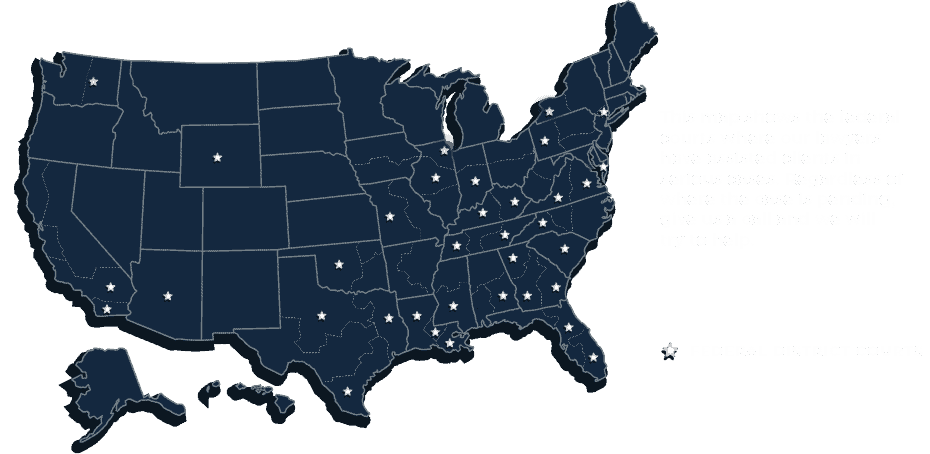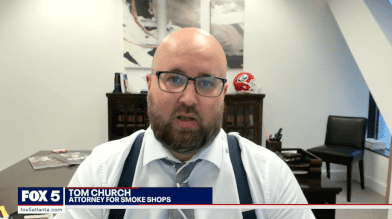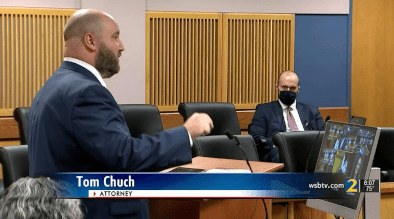CANNABIS LAW IN GEORGIA

The attorneys at the Church Law Firm are leaders in the fast growing world of cannabis law in Georgia. While recreational marijuana is illegal in the state of Georgia, it may surprise you to learn that many other forms of cannabis are legal to buy, sell, and use under state and federal law. Since 2019, “hemp” and “hemp products,” including intoxicating products containing THC, have been legal under the Federal Farm Bill and Georgia’s Hemp Farming Act.
As with any significant change in the law, however, there have been misunderstandings by law enforcement, retailers, and consumers, and government officials. These misunderstandings have unfortunately resulted in arrests, raids, criminal charges, forfeiture proceedings, and extensive litigation in the courts.
Since the legalization of hemp under federal and state law, our firm has emerged as the most experienced and successful law firm in Georgia when it comes to representing individuals and businesses accused of selling illegal marijuana based on their sale of legal hemp products. We have defended clients against false criminal charges and helped them recover property that was wrongfully seized from them. In some cases, we have been able to secure injunctions and restraining orders against law enforcement officials in order to prevent raids and arrests before they even happen.
Read about our firm’s success in cases involving cannabis laws in Georgia.
What is the difference between legal “hemp” and illegal “marijuana”?
For centuries, federal and state law has treated cannabis as an illegal controlled substance regardless of its form, whether that be marijuana “flower” or THC-infused vapes or edibles, like gummies. Under the federal Controlled Substances Act and Georgia’s Controlled Substances Act, marijuana and THC are generally illegal to buy, sell, distribute, or possess. The penalties can be significant, including prison time and hefty fines, and are usually based on the quantity of marijuana or THC involved.
In recent years, however, the legal status of cannabis under state and federal law has changed dramatically. Georgia now has a medical marijuana program, for example, allowing the sale of “low THC oil” to patients with a prescription. The program has strict criteria for eligibility though, and very few individuals qualify for the state’s program. Similarly, federal law has changed in minor ways to recognize that some states have legalized medical and recreational marijuana. The federal government is currently weighing whether to reclassify marijuana as a Schedule III drug, which would reduce the criminal penalties for unauthorized possession and distribution.
Nothing has done more to transform the laws governing cannabis than the legalization of hemp under the 2018 Federal Farm Bill and 2019 Georgia Hemp Farming Act, however, as these landmark bills legalized a broad range of cannabis products and created a multi-billion-dollar industry in Georgia and the rest of the country. It is now legal to buy, sell, and possess cannabis and THC products as long as they meet the definition of “hemp” under federal and state law.
State and federal laws distinguish hemp and hemp products from illegal marijuana and THC products based on the amount of Delta-9-THC in the product. Delta-9-THC, usually referred to as just “THC,” is the psychoactive compound in cannabis that creates a “high.” Under federal law, “hemp” is defined as the cannabis plant, any part of the cannabis plant, and any derivatives, extracts, or cannabinoids extracted from the plant, as long as it contains less than 0.3% Delta-9-THC.
From 2019 to 2024, the definition of “hemp” under Georgia law was identical to the definition under federal law–distinguishing hemp from marijuana based on the legal limit of 0.3% Delta-9-THC. Georgia law also specifically recognized the legality of “hemp products,” which include processed consumable hemp products like vapes, gummies, and pre-rolls that contain hemp extracts like CBD, Delta-8-THC, and other cannabinoids.
Since October 1, 2024, however, Georgia’s definition of “hemp” has changed. The legal limit of THC under the current law is now based, not only on the amount of Delta-9-THC, but also the amount of “THCA,” a non-psychoactive substance in cannabis that converts to Delta-9-THC when heated. The new law was intended to close a “loophole” that allowed for the sale of hemp products that closely resemble marijuana.
The new law, SB 494, also created several other regulations governing the manufacturing and sale of consumable hemp products in Georgia. Unlike federal law, state law now requires hemp businesses to obtain a license from the Department of Agriculture, it prohibits the retail sale of certain hemp products like food products and unprocessed “flower,” and it created packaging and labeling standards for retailers, wholesalers, and manufacturers. SB 494 also set age limits for buying and selling hemp products.
Can I be arrested for selling cannabis even if I have a hemp license?
Yes. While all hemp retailers, wholesalers, and manufacturers now must have a hemp license to conduct business in Georgia, having a hemp license does not necessarily protect you or your employees from arrest or prosecution if you possess or sell products that exceed the 0.3% THC limit, especially if there is evidence that you knew the products were over the legal limit. Licensed hemp businesses can also face civil and criminal penalties based on a failure to comply with other regulations, such as those creating age limits on hemp products, packaging and labeling requirements, and testing standards.
Under SB 494, the Department of Agriculture is the primary regulatory and enforcement agency for the state’s hemp industry. The Department’s inspectors have been conducting unannounced inspections of hemp businesses across the state to check for compliance with the state’s new hemp laws and regulations. More recently, we have seen the Department take action against certain businesses that are accused of repeatedly failing to comply with the new hemp laws.
Aside from regulatory and civil violations, in which a business or individual only stands to lose their license or money, the sale of products containing hemp-derived THC, like Delta-8-THC, Delta-10, THC-P, and THC-O, still exists in a legal “gray area” as far as many law enforcement agencies are concerned. While neither state nor federal law has banned these substances outright, police and prosecutors in some counties are treating them as controlled substances, especially if the products appear to be marketed like marijuana edibles or vapes.
The fact that these prosecutors and law enforcement agencies are wrong about the law has not stopped them from conducting raids and arrests of retail hemp stores, or from prosecuting owners and employees and trying to seize and keep their assets. Our firm remains on the forefront of fighting back against these overreaching government officials.
What are the penalties in felony marijuana cases in Georgia?
Confusion regarding Georgia’s hemp laws has resulted in several law enforcement agencies raiding licensed hemp businesses and arresting their owners and employees on felony marijuana charges–the same kinds of charges that police bring against shady, back-alley drug dealers. This often happens even though the business relied on lab results from accredited labs showing that their products were under the legal limit and otherwise compliant.
Felony marijuana charges in Georgia carry severe penalties which increase depending on the quantity of marijuana involved. Under O.C.G.A. 16-13-30(j), distribution or possession with the intent to distribute marijuana or THC over 0.3% can carry up to 10 years in prison for the first offense.
Under the statute prohibiting marijuana “trafficking,” which is triggered when there are at least 10 pounds of marijuana, a defendant faces a mandatory minimum sentence of 5, 7, or 15 years in prison depending on the amount of marijuana, and the potential fines start at $100,000. While federal prosecutions involving marijuana are becoming less common, there are also federal laws that similarly prohibit the possession or sale of marijuana and THC over 0.3%.
Of course, there is so much more at stake than just prison time or harsh fines if you are falsely charged with felony marijuana offenses. Even minor criminal charges can impact immigration status, employment, and your licensing status. That is why it is important to be aware of the laws and regulations governing the hemp industry in Georgia and take all necessary steps to comply with them.
What can I do to protect myself against criminal charges based on the sale or possession of legal cannabis products?
Nothing can guarantee that a local district attorney or sheriff won’t overreach or misinterpret Georgia’s hemp laws, but there are many things businesses can do to minimize the chances of any misunderstandings.
- The first thing businesses should do is familiarize themselves with SB 494, which imposes regulations and standards on hemp retailers, wholesalers, manufacturers, processors, and labs.
- A record of compliance or good faith attempts at compliance with state hemp regulations can put a business in a much stronger position to defend itself if false charges are brought against its owners or employees or if unwarranted raids are conducted.
- Businesses should also consult with experienced lawyers, like our firm, to review their inventory and business practices, explain any ambiguous laws, and provide advice on compliance issues.
- Hemp businesses should also make sure they are purchasing their inventory from vendors that are licensed to sell their products in Georgia, and that the products they are purchasing are compliant based on lab results from labs that are licensed in Georgia. The Department of Agriculture’s website lists all companies that have been granted a hemp license.
What should I do if I’m facing criminal charges for selling cannabis?
If you’ve been arrested or charged with a cannabis offense in Georgia, it’s critical to have an experienced criminal defense lawyer who understands both state and federal drug laws, especially cannabis laws. At the Church Law Firm, we’ve successfully defended clients facing felony marijuana charges, civil asset forfeiture proceedings, and other legal problems based on their sale of legal cannabis products.
If you or a loved one has been targeted by law enforcement based on their legal cannabis business, contact our firm to speak to one of our experienced attorneys. We know cannabis laws in Georgia and are ready to fight for you.


Our Cases and Results
Legal Victory for South Fulton Smoke Shop: Criminal Charges Dismissed, Assets Returned
Court Overturns 6-Year Sentence After The Church Law Firm Proves Prosecutors Breached Plea Agreement
Our Firm Gets Charges Dismissed for Client Charged with Trafficking 300 Pounds of Marijuana
Our Firm Secures Time Served Sentence for Restaurant Owner Falsely Charged with Labor Trafficking and Alien Smuggling
Our Firm Obtains Release for Client Initially Denied Bond in SDGA Drug Trafficking Case
Our Firm Obtains Probation Sentence for Client Convicted of Possessing Child Pornography


Serving clients across the United States
Se Habla Español

The Church Law Firm
Centennial Tower
101 Marietta Street NW
Suite 3300
Atlanta, Georgia 30303
(404) 223-3310
© 2024 by The Church Law Firm LLC. All rights reserved.
Disclaimer | Sitemap









